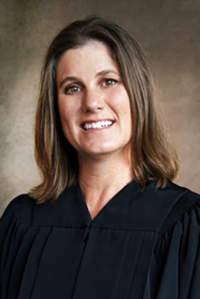District Court Judge

Grant County
View state court bio
Contact with Chambers
• Preferred method to contact chambers:
• To whom may attorneys direct scheduling/logistical questions? Court Reporter Mary Kay Palmer
• To whom may attorneys direct substantive questions? Court Reporter Mary Kay Palmer
• Set forth your practices and procedures for scheduling motion hearings. Contact court administration.
• Identify any type of motion for which you do not require a hearing.
• Do you accept telephone calls from attorneys to rule on discovery disputes that occur during depositions? Yes.
• How much time do you allot for motion hearings? Depends on the issue, but usually 15 to 30 minutes.
• Set forth your practices and procedures with respect to attending a hearing by telephone or video conference. If hearing is not scheduled remote, written request to attend by telephone or video.
• Set forth your practices and procedures with respect to discovery motions. You are competent professionals. Resolve it. If absolutely necessary file a motion.
• Set forth your practices and procedures with respect to stipulations of the parties, including stipulations for protective orders. They can submit and ask for an order. Proposed order should be included. If I have concerns I will set it on for a quick hearing.
• Do you have any particular requests or procedures relating to requests to amend the scheduling order? Parties should work together to come to an agreement, and submit it to the court.
Pre-Trial Procedures
• Describe your preferred procedures for pretrial settlement conferences, including the timing of such conferences, persons who must attend, whether persons may attend by telephone or video conference, and how you participate in settlement discussions. I do not participate in settlement discussions.
• Identify what technology you use in the courtroom and state whether you prefer a particular electronic format.
• Set forth your practices and procedures with respect to attorney’s use of technology in the courtroom and during trial. They should prepare in advance. I do not tolerate keeping a jury waiting as attorneys try to figure out the technology.
• Do you permit parties to bifurcate oral argument so different attorneys address different legal issues? No preference.
In-Person Trials
• Are you willing to provide a date certain for trial? I try, but do not always have control of trial dates.
• Set forth your practices and procedures with respect to marking and using exhibits. Mark prior to trial. Following the scheduling or pretrial order.
• Set forth your practices and procedures with respect to handling objections. State the rule. Limited bench conferences.
• May attorneys obtain daily transcripts during trial? If so, what procedure should attorneys follow? No, unless permission is granted ahead of time.